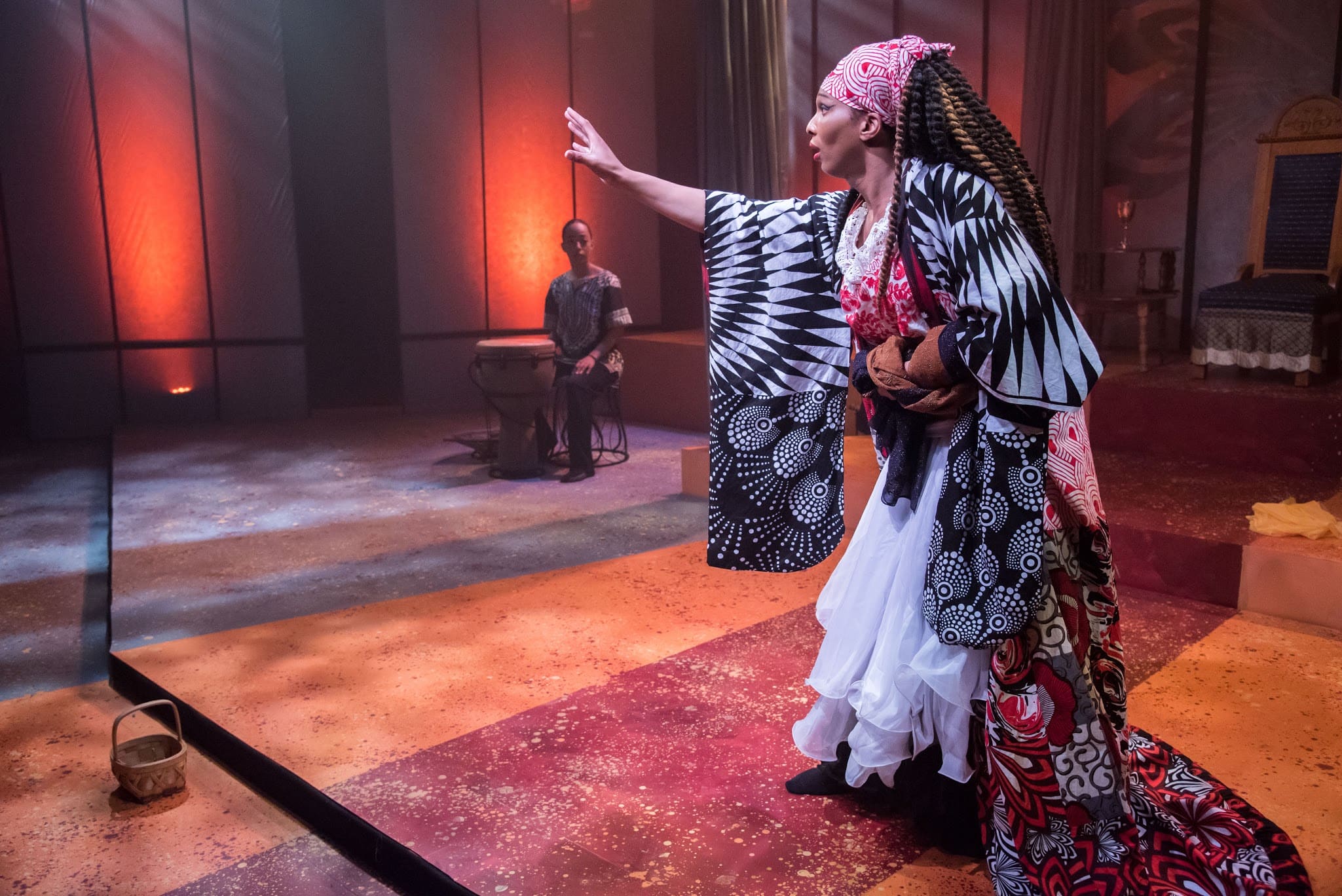Dane Figueroa Edidi is one of DC’s most original and multitalented theater artists. A dancer, actor, poet, playwright, and choreographer, she is also a teacher, novelist, political commentator as well as (in her words) a priestess, goddess, and healer. Having followed her work for several years now, I can attest: Dane Figueroa Edidi is a sui generis force of star power and storytelling sorcery.
Back in early 2016 I had a conversation with Edidi (a two-time Helen Hayes Award nominee) and Natsu Onoda Power (recent recipient of two Helen Hayes Awards for The Lathe of Heaven). The topic was the representation of trans lives in the theater (“Trans Lives and Theater as Change Agent”). To my question about how gender and acting had played out in her life, Edidi answered:
I’ve always wanted to play divas. I wanted to play queens, I wanted to play Lady Macbeth. I never wanted to play Desdemona, but people wanted me to play Othello. And so in my training, there was this fight in the way people perceived my body—they were not feeding into my dream of being these amazingly great women. So what I did was study these great women’s roles separately aside. I would take the training that I was getting in class, and then I would utilize that as Clytemnestra or as Lady M or as Medea. And I would be in my room, practicing these monologues and learning these amazing women—because I knew that eventually we would get to this place.

By “this place” Edidi could well have meant the present moment, as she is now commanding the Theater Alliance stage at Anacostia Playhouse in her solo play Klytmnestra: An Epic Slam Poem. It is a monumental performance, combining lyrical poetry, sensual dance, familiar tunes, catchy raps and chants, and ancestral invocation. And it is DC’s first mainstage production of a play written and performed by a local trans artist of color.
The play takes place in an ethereal throne room designed by Debra Kim Sivigny with translucent walls lit by Niomi Collard to suggest someplace outside time. The preshow playlist by Kenny Neal portends a theme: “Black Women,” “Ladies First,” “A Woman’s Worth…” Edidi enters wearing a headscarf over her flowing dreads and a festive two-piece garment of multicolored print (also by Sivigny) as she rings a tiny sacramental bell. A Drummer, Autumn Angelettie, accompanies Edidi, who as Priestess invites the audience to join her in a ceremonial call-and-response acknowledgment of black women ancestors: “Ashe, Ashe…”
What Edidi has begun is a bold reclaiming of Greek myth as Mother Africa’s, a rereading/re-rendering of the ancient tragedies that transforms them into poetic-justice narratives centering black women—both as righteous agents of their destiny and as rebels to patriarchy. As politico-poetic dramaturgy it is audacious, and Danielle A. Drakes has directed it with prodigious passion.
Edidi dons a colorful robe that looks African/Indonesian that has been draped over the throne. Suddenly she is the Goddess Queen Klytmnestra, recounting how Agamemnon murdered her first husband and first child then raped her and made her his wife—this before Agamemnon killed their daughter Iphigenia in order to raise sufficient wind to sail to Troy to war. (Those who have seen or will see The Orestia running concurrently at Shakespeare Theater Company will note that Edidi has ingeniously included versions of the myth not mentioned by Aeschylus.)
Among Edidi’s gifts as writer and performer is her preternatural talent for giving voice to the fury of women wronged. She is scary good at it. There is plenty of playfulness in Klytmnestra, quite a bit of humor and wit, melodious music (including a moving sing-along at the end)—but when time comes for Klytmnestra’s righteous rage to kick in, Edidi tears up the stage.

Besides the title role, Edidi portrays several other female characters, among them Klytmnestra’s sister Helen (she whose beauty launched a thousand ships), their mother Leda (she who was raped by Zeus posing as a swan), her slaughtered daughter Iphigenia, and her husband Agamemnon’s concubine Kassandra. Each supporting character is signaled by a different sampling of black music and art. For instance, Klytmnestra’s matricidal son Orestes, the only male character in the cast list, is depicted as a gangsta rapper.
The play presumes some foreknowledge of the myths it artfully appropriates—the cascade of poetic eloquence can make plot points easy to miss—and the program provides no synopsis or who’s-who, which could have made the characters’ stories easier to follow. But even without a backstory briefing, the dramatic and emotional peaks that erupt in Klytmnestra well earn the word epic. And Sivigny’s set, Neal’s sounds, Collard’s lights, and Angelettie’s drum punctuation make for a stagecraft experience every bit as spectacular as the physical and vocal range of Edidi’s tour-de-force performance.
Running Time: 90 minutes, with no intermission.
Klytmnestra plays through June 16, 2019, at Theater Alliance performing at Anacostia Playhouse – 2020 Shannon Place SE, in Washington, DC. Purchase tickets at the box office, or go online.
Correction: An earlier version of this review said that Klymnestra “is DC’s first mainstage production of a play written and performed by a trans artist of color.” In fact it was preceded by Mashuq Mushtaq Deen’s Draw the Circle at Mosaic Theater Company of DC. Klytmnestra is the first such production by a local trans artist of color.




